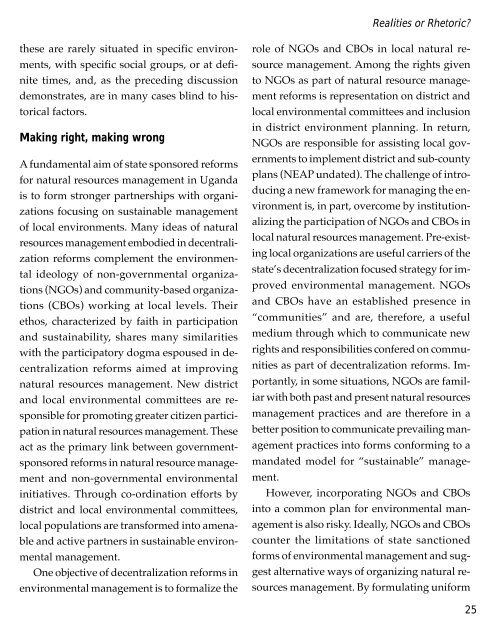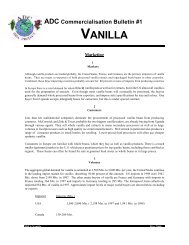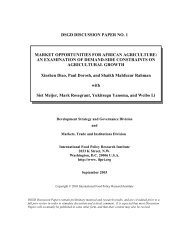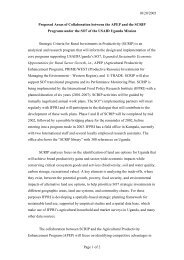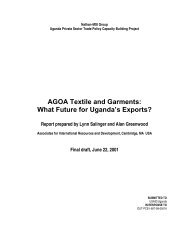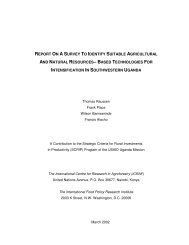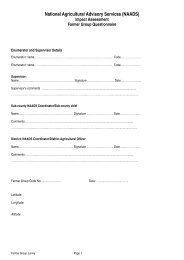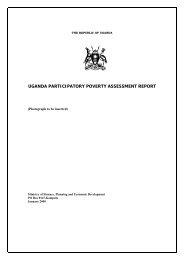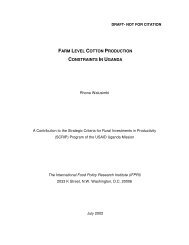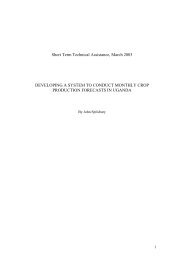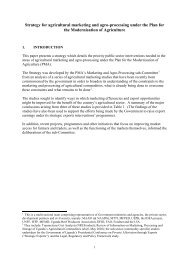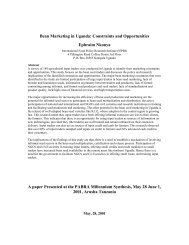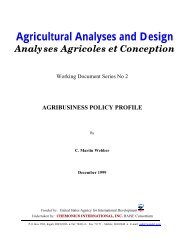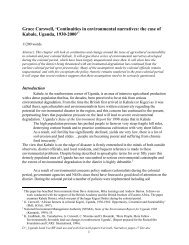Decentralisation in Uganda Rhetoric-Chapter3. - Foodnet
Decentralisation in Uganda Rhetoric-Chapter3. - Foodnet
Decentralisation in Uganda Rhetoric-Chapter3. - Foodnet
You also want an ePaper? Increase the reach of your titles
YUMPU automatically turns print PDFs into web optimized ePapers that Google loves.
these are rarely situated <strong>in</strong> specific environments,<br />
with specific social groups, or at def<strong>in</strong>ite<br />
times, and, as the preced<strong>in</strong>g discussion<br />
demonstrates, are <strong>in</strong> many cases bl<strong>in</strong>d to historical<br />
factors.<br />
Mak<strong>in</strong>g right, mak<strong>in</strong>g wrong<br />
A fundamental aim of state sponsored reforms<br />
for natural resources management <strong>in</strong> <strong>Uganda</strong><br />
is to form stronger partnerships with organizations<br />
focus<strong>in</strong>g on susta<strong>in</strong>able management<br />
of local environments. Many ideas of natural<br />
resources management embodied <strong>in</strong> decentralization<br />
reforms complement the environmental<br />
ideology of non-governmental organizations<br />
(NGOs) and community-based organizations<br />
(CBOs) work<strong>in</strong>g at local levels. Their<br />
ethos, characterized by faith <strong>in</strong> participation<br />
and susta<strong>in</strong>ability, shares many similarities<br />
with the participatory dogma espoused <strong>in</strong> decentralization<br />
reforms aimed at improv<strong>in</strong>g<br />
natural resources management. New district<br />
and local environmental committees are responsible<br />
for promot<strong>in</strong>g greater citizen participation<br />
<strong>in</strong> natural resources management. These<br />
act as the primary l<strong>in</strong>k between governmentsponsored<br />
reforms <strong>in</strong> natural resource management<br />
and non-governmental environmental<br />
<strong>in</strong>itiatives. Through co-ord<strong>in</strong>ation efforts by<br />
district and local environmental committees,<br />
local populations are transformed <strong>in</strong>to amenable<br />
and active partners <strong>in</strong> susta<strong>in</strong>able environmental<br />
management.<br />
One objective of decentralization reforms <strong>in</strong><br />
environmental management is to formalize the<br />
Realities or <strong>Rhetoric</strong>?<br />
role of NGOs and CBOs <strong>in</strong> local natural resource<br />
management. Among the rights given<br />
to NGOs as part of natural resource management<br />
reforms is representation on district and<br />
local environmental committees and <strong>in</strong>clusion<br />
<strong>in</strong> district environment plann<strong>in</strong>g. In return,<br />
NGOs are responsible for assist<strong>in</strong>g local governments<br />
to implement district and sub-county<br />
plans (NEAP undated). The challenge of <strong>in</strong>troduc<strong>in</strong>g<br />
a new framework for manag<strong>in</strong>g the environment<br />
is, <strong>in</strong> part, overcome by <strong>in</strong>stitutionaliz<strong>in</strong>g<br />
the participation of NGOs and CBOs <strong>in</strong><br />
local natural resources management. Pre-exist<strong>in</strong>g<br />
local organizations are useful carriers of the<br />
state’s decentralization focused strategy for improved<br />
environmental management. NGOs<br />
and CBOs have an established presence <strong>in</strong><br />
“communities” and are, therefore, a useful<br />
medium through which to communicate new<br />
rights and responsibilities confered on communities<br />
as part of decentralization reforms. Importantly,<br />
<strong>in</strong> some situations, NGOs are familiar<br />
with both past and present natural resources<br />
management practices and are therefore <strong>in</strong> a<br />
better position to communicate prevail<strong>in</strong>g management<br />
practices <strong>in</strong>to forms conform<strong>in</strong>g to a<br />
mandated model for “susta<strong>in</strong>able” management.<br />
However, <strong>in</strong>corporat<strong>in</strong>g NGOs and CBOs<br />
<strong>in</strong>to a common plan for environmental management<br />
is also risky. Ideally, NGOs and CBOs<br />
counter the limitations of state sanctioned<br />
forms of environmental management and suggest<br />
alternative ways of organiz<strong>in</strong>g natural resources<br />
management. By formulat<strong>in</strong>g uniform<br />
25


